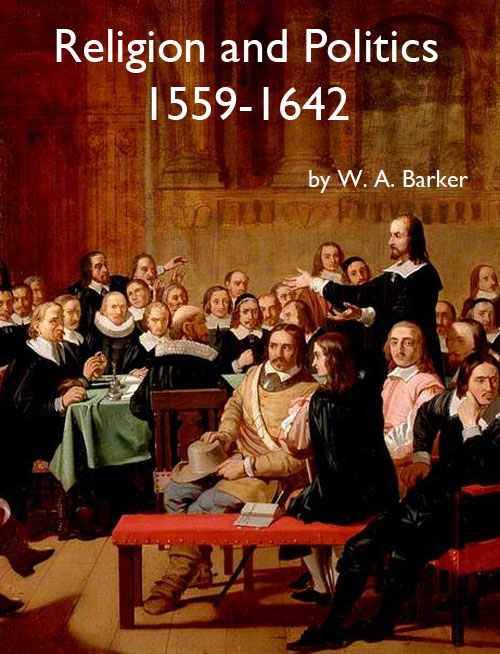Religion and Politics 1559-1642
Classic Pamphlet

It is a truism to say that religion and politics were inextricably mixed in the seventeenth century.
"So natural" wrote Richard Hooker,"is the union of religion with Justice, that we may boldly deem there is neither where both are not" Sir John Eliot observed that in the House of Commons "wherever that mention does break forth of the forth of the fear of dangers in religion and the increase of popery, their affections are much stirred; and whatever is obnoxious in the state , it then is reckoned as an incident to that."
In the Whitehall debates of 1648, Mr.Edward Walford commented that he knew nothing "but that Kings and Armies and Parliaments might have been quiet at this day, if they would have left Israel alone." This close connection, so easily accepted by Englishmen in the seventeenth century, is often bewildering to us today and seems almost to set a great gulf between us and them, so wide as to make understanding impossible.
Mr. Trevor-Roper, in his introduction in his life of Archbishop Laud, examines this gulf and constructs the bridge to bear us from the twentieth to the seventeenth century. Religion in the seventeenth century was not merely a doctrine concerning the origins of the world and the destiny of the individual soul; it was also the "ideal expression of a particular social and political organisation as well," which explains "why men were once prepared to fight for religion in a way that they will not fight for it now, when most religions have shed their political implications."
This ideal expression in terms of religion was a medieval legacy (see C. Morris, Political though in England from Tyndale to Hooker). The conception of a Christian community under God was not destroyed by the Reformation: the godly prince in place of the Pope simply became the focus of the community where Church and State were but two aspects of one organic society. Obedience to the power ordained of God meant obedience to the divinely appointed prince (whose divine right was emphasised against papal claims) and obedience naturally included conformity with what the prince thought to be true religion. Since Church and State were but different aspects of the same society, a citizen was synonymous with a Christian, and nonconformity with the established religion theoretically involved outlawry from the civil state. The observation of a spectator at the execution of Campion, that in the Jesuit's Catholicism "all treason is contained," merely epitomises the general opinion of the sixteenth century to religious dissent of any kind from the established religion. As Laud put it, "whoever he be, he must live in the body of the commonwealth and in the body of the Church."
This resource is FREE for HA Members.
Non HA Members can get instant access for £3.49

